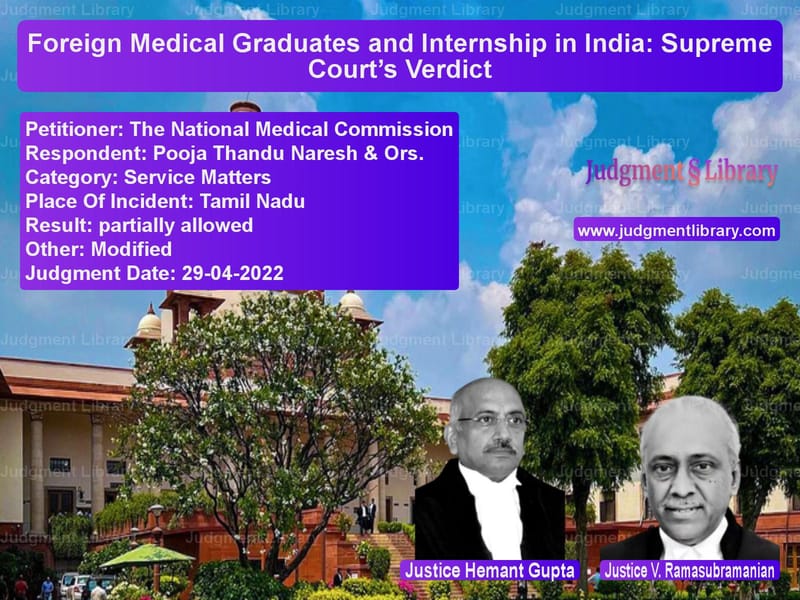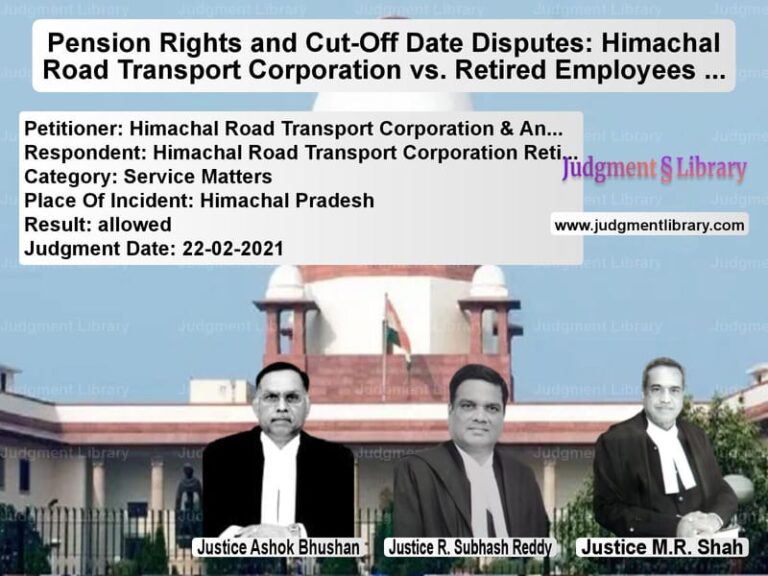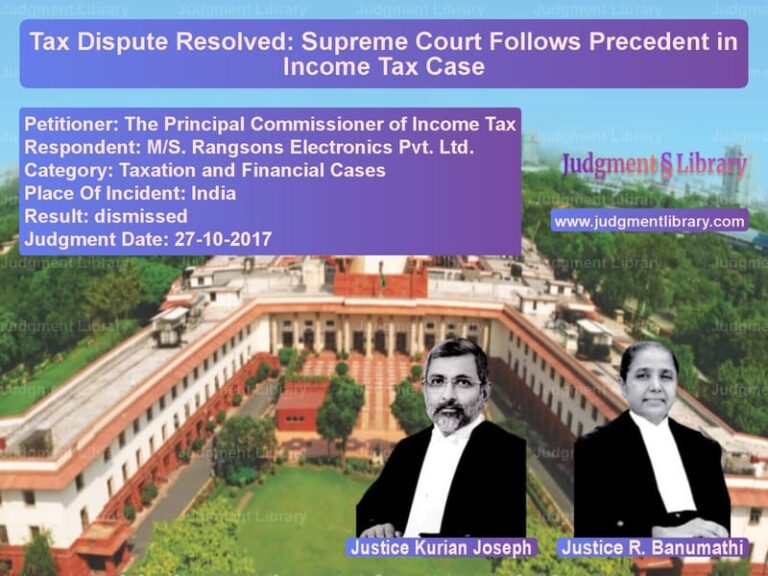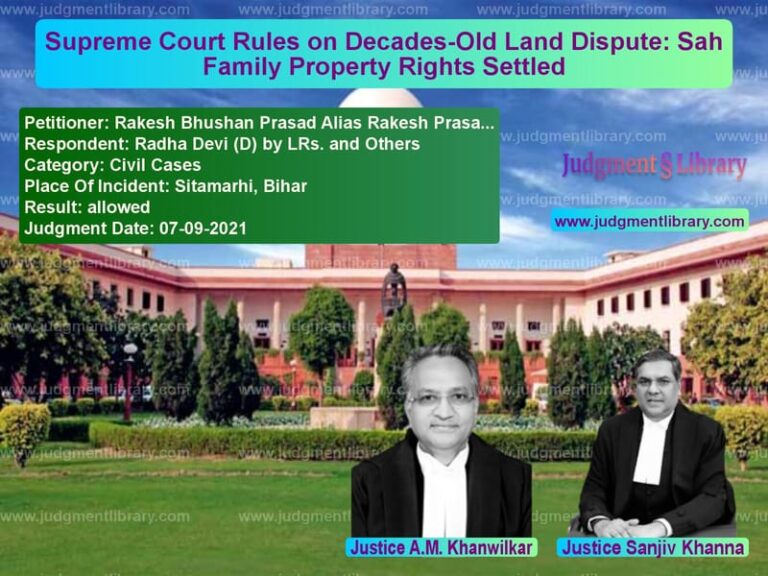Foreign Medical Graduates and Internship in India: Supreme Court’s Verdict
The case of National Medical Commission vs. Pooja Thandu Naresh & Ors. was a landmark ruling by the Supreme Court of India regarding the eligibility of Indian students who pursued medical education abroad but were unable to complete clinical training due to the COVID-19 pandemic. The Court’s decision addressed critical issues regarding provisional registration, clinical training, and internship requirements.
Background of the Case
The petitioners, including Pooja Thandu Naresh, were Indian students who had enrolled in foreign medical institutions, particularly in China. They had completed nine semesters of their course, including on-campus clinical training. However, due to the pandemic, the clinical training for the 10th semester was conducted online. Despite this, they were awarded MBBS degrees by their respective foreign institutes.
Upon returning to India, these students sought provisional registration with the Tamil Nadu Medical Council to undergo the required internship in India. However, their applications were rejected on the grounds that they had not completed the required clinical training in a physical setting. The Tamil Nadu Medical Council issued circulars on 12.11.2020 and 24.12.2020, stating that students who had not undergone physical clinical training were ineligible for registration.
The affected students challenged these circulars before the Madras High Court, which ruled in their favor and directed the Tamil Nadu Medical Council to grant them provisional registration. The National Medical Commission (NMC) appealed against this decision in the Supreme Court.
Legal Issues
- Whether foreign medical graduates who completed clinical training online due to the pandemic were eligible for provisional registration in India.
- Whether the Tamil Nadu Medical Council’s rejection of their applications was justified.
- The applicability of the Screening Test Regulations, 2002, and the National Medical Commission (Foreign Medical Graduate Licentiate) Regulations, 2021.
Arguments by the Parties
Petitioners’ Arguments
- The students argued that they had successfully completed their MBBS degrees and passed the Foreign Medical Graduate Examination (FMGE), which qualifies them for provisional registration.
- They contended that the Tamil Nadu Medical Council had arbitrarily denied them registration while granting it to other similarly placed students.
- They cited the judgment in Medical Council of India vs. J. Saai Prasanna & Ors., which upheld the right of foreign medical graduates to seek provisional registration after passing the screening test.
- They emphasized that the pandemic had created unprecedented challenges, making it impossible for them to complete physical clinical training abroad.
Arguments by the National Medical Commission
- The NMC argued that physical clinical training is an essential component of medical education and cannot be substituted by online learning.
- It contended that under the Screening Test Regulations, 2002, a candidate must complete the entire course, including clinical training, at the same foreign institution.
- The NMC maintained that granting provisional registration without physical clinical training would compromise public health and the integrity of medical education in India.
- It referred to the National Medical Commission (Foreign Medical Graduate Licentiate) Regulations, 2021, which impose stricter requirements for foreign medical graduates.
Supreme Court’s Ruling
Key Observations
- The Court acknowledged the unprecedented nature of the COVID-19 pandemic and the challenges faced by students.
- It emphasized that medical education requires hands-on clinical training, which cannot be conducted online.
- The Court observed that allowing graduates without practical experience to practice medicine would compromise healthcare standards.
- However, the Court also recognized the students’ predicament and the need to find a fair solution.
Final Decision
The Supreme Court partially allowed the appeal and issued the following directions:
- The NMC was directed to frame a one-time special scheme within two months to allow affected students to undergo clinical training in India.
- Students would be required to complete the prescribed clinical training in designated medical colleges.
- After completing the training, they would have to pass a competency test before being granted provisional registration.
- The Court clarified that this decision was case-specific and should not be considered a precedent for future cases.
Implications of the Judgment
For Foreign Medical Graduates
- Foreign medical students affected by the pandemic now have a structured pathway to complete their clinical training in India.
- They must undergo additional clinical training before being eligible for provisional registration.
For Medical Education in India
- The judgment reinforces the importance of practical training in medical education.
- It sets a benchmark for future regulations governing foreign medical graduates.
- The decision ensures that quality standards in medical practice are maintained.
For the National Medical Commission
- The ruling mandates the NMC to establish a structured framework for accommodating foreign medical graduates during exceptional circumstances.
- It highlights the need for flexibility in regulatory frameworks while maintaining medical education standards.
Conclusion
The Supreme Court’s judgment in National Medical Commission vs. Pooja Thandu Naresh & Ors. strikes a balance between maintaining medical education standards and addressing the challenges posed by the COVID-19 pandemic. While the Court upheld the requirement for physical clinical training, it provided a special provision for affected students, ensuring that their education and future careers are not jeopardized. This ruling will have a lasting impact on how foreign medical graduates are integrated into India’s healthcare system.
Petitioner Name: The National Medical Commission.Respondent Name: Pooja Thandu Naresh & Ors..Judgment By: Justice Hemant Gupta, Justice V. Ramasubramanian.Place Of Incident: Tamil Nadu.Judgment Date: 29-04-2022.
Don’t miss out on the full details! Download the complete judgment in PDF format below and gain valuable insights instantly!
Download Judgment: the-national-medical-vs-pooja-thandu-naresh-supreme-court-of-india-judgment-dated-29-04-2022.pdf
Directly Download Judgment: Directly download this Judgment
See all petitions in Recruitment Policies
See all petitions in Public Sector Employees
See all petitions in Education Related Cases
See all petitions in Judgment by Hemant Gupta
See all petitions in Judgment by V. Ramasubramanian
See all petitions in partially allowed
See all petitions in Modified
See all petitions in supreme court of India judgments April 2022
See all petitions in 2022 judgments
See all posts in Service Matters Category
See all allowed petitions in Service Matters Category
See all Dismissed petitions in Service Matters Category
See all partially allowed petitions in Service Matters Category







